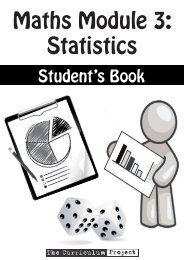GlossaryThis glossary is in alphabetical order. <strong>The</strong> meanings of words given relate to the context of this module. <strong>The</strong> wordsmay have other meanings in other contexts.activist (noun): a person who uses direct actionto try to change things.allocation (noun): sharing out.appropration (noun): to take something illegallyand without payment.asset (noun): an item of value.auction (noun): a sale of property to the personwho pays the most moneyback-breaking (adj): very difficult, physicallyexhausting.to bid (verb): offer a price for somethingbidder (noun): a person who bids in an auctionboycott (noun): a refusal to do something, orbuy something, out of principle.byproduct (noun): something produced inaddition to the main product.Chair (noun): position of leadership.cocaine (noun): a drug made from the coca plant.to colonise (verb): to take over, populate andrule an area of land.compensation (noun): money given to someonewho has suffered an injustice.to compete (verb): to be in competition.to comply (verb): to do what you are asked todo.to condemn (verb): to say that something iswrong.condition (noun): a requirement attached tosomething given.constitution (noun): the basic principles andlaws of a nation.to contaminate (verb): to pollute.corruption (noun): illegal use of power, orposition, for personal benefit.to cultivate (verb): to grow.coup (noun): a taking of power by force, usuallyby the military.customs (noun): the agency that administers tax(‘duty’) placed on goods crossing borders, andsearches for and tries to prevent the smugglingof untaxed or illegal goods.debt (noun): money that is owed.democratise (verb): become more democratic.demonstration (noun): a gathering of people whoprotest against something.development (noun): advancement, improvement.discrimination (noun): denying someone equaltreatment on the basis of age, skin colour,nationality, religion, gender, etc.dispute (noun): argument.domestic (adj): home, as in country.to dominate (verb): to have a lot of control over.drastic (adj): very severe and sudden.to dump (verb): to get rid of unwanted things.elite (noun): privileged group of people, often inpositions of power and influence.to eradicate (verb): to get rid of, destroy.essential (adj): absolutely necessary.to expand (verb): to grow, get bigger.exploitation (noun): to make use of someone’slabour unfairly, sometimes through force.extortion (noun): using authority and threats totake money from people illegally.extrajudicial (adj):not authorised by law.fake (adj): not real, not original, not authentic.to fire (verb): to dismiss someone from their job.fixed exchange rates: a system where the exchangerates of the currencies of a group of countries arefixed so that they do not change. This is usuallydone to increase economic stability in a region.formation (noun): creation.to found (verb): to start, create.garage (noun): a small building (usually one room)used for storage, or in which a car is parked. Somepeople use this space for a ‘home-office’.grant (noun): money given to support an individualor a country.gross (adj): total, whole.income (noun): the money that people receive fromtheir salary and other investments.indicator (noun): a value/statistic which shows thehealth of an economy.inequality (noun): not being equal.to inspire (verb): to give someone hope and thedesire to try to do something.integrate (verb): join together.intensive agriculture (adj): production of a lot offood from a small area of land using farmmachinery and chemical fertilisers.interest (noun): fee paid (usually every month)when you borrow money.to interfere (verb): to get inolved in something totry to influence it.to intervene (verb): to get involved in.isolated (verb): separated from others.isolation (noun): being cut off or separated fromothers.jurisdiction (noun): the limits in which law orauthority can be used.landless (adjective): without land.to lay off (verb): when an employer tells anemployee to leave their job.<strong>The</strong> <strong>Curriculum</strong> <strong>Project</strong> ECONOMICS: an introduction - Teacher’s <strong>Guide</strong>76
Glossary (cont’d)legitimacy (noun): legal status, recognition.to liberalise (verb): to make more free, reducerestrictions.liberalisation (noun): making more free,removing controls.life expectancy (noun): the average amount oftime that someone can expect to liveliteracy (noun): being able to read and write.logging (noun): cutting down treesmangrove (noun): a species of trees that livesnear water, often in swamps.to maximise (verb): to make as big as possible.to monitor (verb): to oversee, check.to nationalise (verb): when the government takesownership of private companies.to negotiate (verb): to discuss in order to reachan agreement.non-legitimate (adj): not lawful.to obtain (verb): to get, acquire.to occupy (verb): to enter and take control of aplace.opposition (noun): resistance, disagreement.to override (verb): to dominate, have priorityparamilitary (noun, adj): a semi-official orauxiliary military force.pension (noun): income paid to people after theyretire, by governments or from private funds.plentiful (adj): available in large quantities.poverty (noun): the state of being poor.predictably (adverb): in a way that people cantell what is going to happen.product (noun): anything that is produced.to protest (verb): to argue against, object.publicity (noun): information about somethingin the news/media.pus (noun): yellow liquid that comes out of awound or sore.to rank (verb): to put in order.relative (adj): considered in relation tosomething else, proportionate.to relax (verb): to make less strict.repetitive (adj): repeated many times.resource (noun): store, supply.restriction (noun): limitation.rural (adj): countryside (opposite of ‘urban’).sanctions (noun): cutting of economic links to acountry.sector (noun): a part of the economyto segregate (verb): to divide.self-sufficient (adj): not dependent on anyoneelse.severely (adverb): badly.to shrink (verb): to get smaller.slave (noun): a person who is owned by anotherperson, and usually used for labour.slum (noun): an overcrowded, poor part of atown or city with bad housing.to specialise: to focus on a small number of tasks.lternative.specialisation (noun): focusing on a small numberof tasks which one becomes very good at.subsititute (adj): replacement, asupreme (adj): highest, most powerful.surplus (noun): extra.to survive (verb): to stay alive.technique (noun): a way of doing something.tear gas: gas that stings your eyes, used by policeto break up crowds.territory (noun): geographic area claimedunder a particular law or authority.totalitarian (adj): the state having total control.transparent (adj): free from deceit, clear.unification (noun): joining together.unique (adj): different from all the others.unprecedented (adj): something which has neverhappened before.unrestrained (adj): without any limitation, free.violation (noun): an action against the law.wages (noun): salary, income, pay.<strong>The</strong> <strong>Curriculum</strong> <strong>Project</strong> ECONOMICS: an introduction - Teacher’s <strong>Guide</strong>77



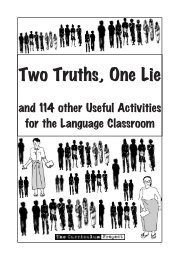
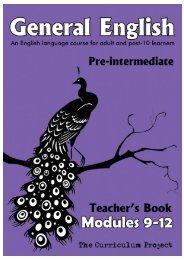
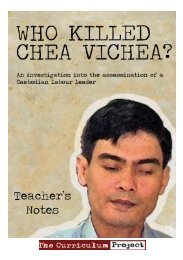
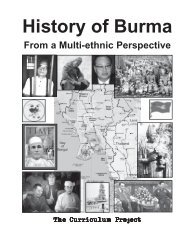
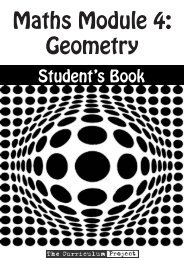

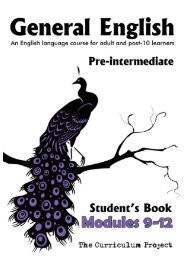

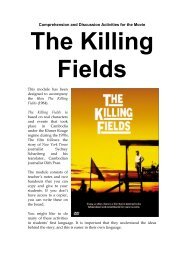
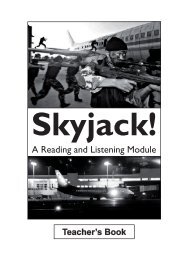
![[Eng] Nov 2012 DRAFT - The Curriculum Project](https://img.yumpu.com/45590859/1/184x260/eng-nov-2012-draft-the-curriculum-project.jpg?quality=85)


